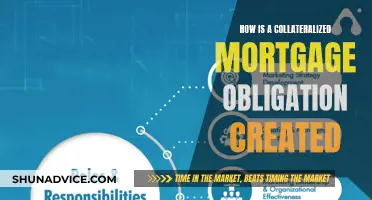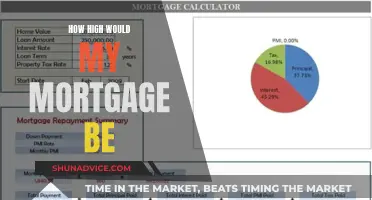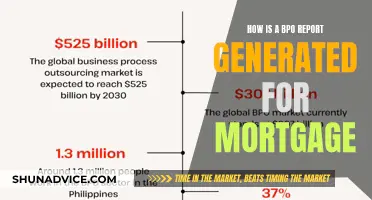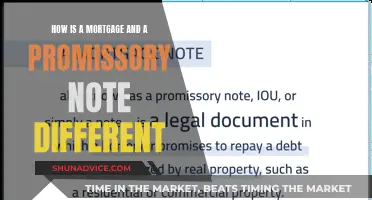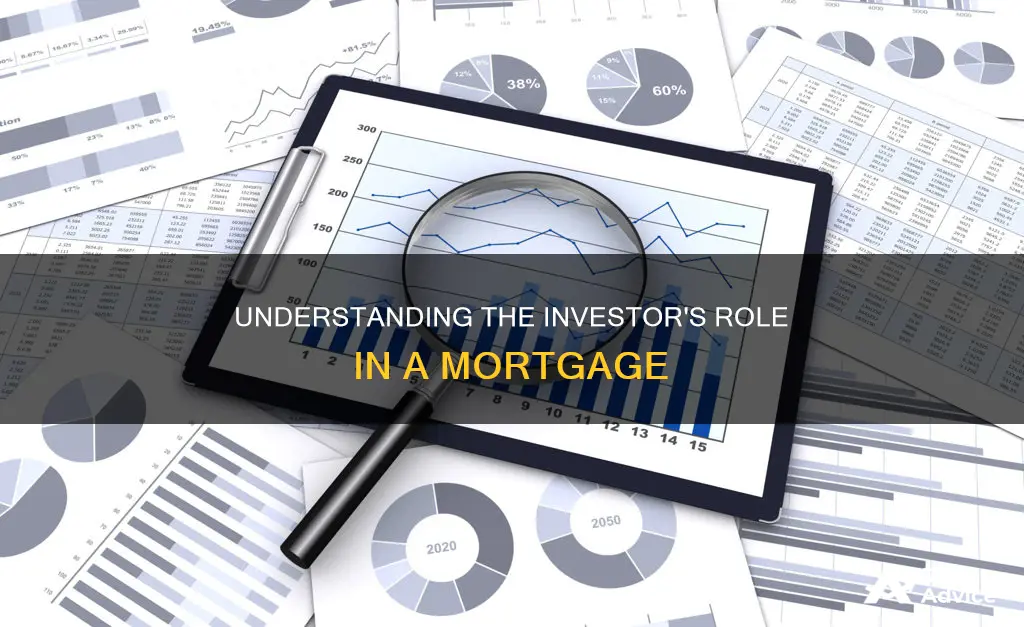
A mortgage investor is an entity or individual that purchases mortgages from lenders. Usually, an investor is a government-sponsored enterprise (GSE), such as Fannie Mae, Freddie Mac, or Ginnie Mae. However, sometimes private investors can purchase specific types of mortgages through brokers or investment companies. Banks and lenders sell mortgages to investors to make additional money by collecting interest and to maintain liquidity so they can continue to lend to other borrowers. Investors keep the market liquid, allowing lenders to continue helping borrowers purchase homes. They also set guidelines that determine the types of loans that can be obtained, such as eligibility requirements and the types of real estate that can be purchased.
| Characteristics | Values |
|---|---|
| Definition | An investor is an entity or individual that purchases mortgages from lenders |
| Examples | Fannie Mae, Freddie Mac, Ginnie Mae, Federal Housing Administration (FHA), Department of Veterans Affairs (VA), U.S. Department of Agriculture (USDA) |
| Investor Types | Government-sponsored enterprises, government agencies, private investors |
| Investor Role | Provides funds for lenders to create more loans, sets guidelines for types of loans |
| Investor Benefits | Return on investment through capital growth or capital gain |
| Lender Benefits | Liquidity, ability to offer more loans, additional income through interest |
| Borrower Impact | Investors set eligibility requirements, which may include credit scores, debt-to-income ratios, and property types |
| Servicer Role | Entity that handles day-to-day loan processing activities and collects monthly payments |
What You'll Learn

The secondary mortgage market
Several players participate in the secondary mortgage market. These include mortgage originators (who create the loans), mortgage aggregators (who buy and securitize the loans), and investors who purchase the securitized loans. Mortgage originators, usually banks or financial institutions, use their own funds to make loans. However, to replenish their funds and continue lending, they often sell these loans on the secondary market. Depending on their size and sophistication, they may aggregate mortgages for a period before selling the whole package or sell individual loans as they are originated.
The mortgage aggregators, also known as securitizers, distribute thousands of similar loans in an MBS. After an MBS is formed, it is sold to a securities dealer, often a Wall Street brokerage firm, which further packages the MBS and sells it to investors seeking income-oriented instruments. These investors receive the interest income from the borrowers' repayments. Before the secondary market was established, only large banks had the extensive funds necessary to provide funds for the life of a loan, usually 15 to 30 years. As a result, potential homebuyers struggled to find mortgage lenders, and lenders charged higher interest rates due to less competition.
Creating Mortgage-Backed Securities: A Step-by-Step Guide
You may want to see also

Government-sponsored enterprises
GSEs are critical to providing liquidity, stability, and affordability to the mortgage market, especially for long-term, fixed-rate mortgage loans. They purchase and securitize mortgage loans from housing finance agencies (HFAs) and other lenders, who then use the proceeds to finance more mortgage loans. This helps to keep cash flowing in the mortgage market.
Some well-known examples of GSEs include Fannie Mae, Freddie Mac, and the Federal Home Loan Banks (FHLBs). Fannie Mae, or the Federal National Mortgage Association, was introduced to improve the flow of credit in the housing market and reduce the cost of that credit. Similarly, Freddie Mac, a federally chartered and shareholder-owned private company, works to increase the availability of mortgage credit to low- and moderate-income families and underserved areas. Farmer Mac, established in 1988, is another example of a GSE that guarantees agricultural mortgage-backed securities purchased by investors.
GSEs also issue short- and long-term bonds (agency bonds) that are implicitly backed by the US government. They set borrower eligibility guidelines for conventional loans and play a role in determining what types of loans individuals can obtain.
Mortgage Money: Transfer Process and Procedures
You may want to see also

Government agencies
Government-backed mortgages are home loans that are fully or partially insured by a government agency. They are offered to eligible individuals by traditional private lenders but insured by federal agencies. This reduces the risk for lenders, allowing them to be more lenient with credit scores and down payments.
The US government incentivizes homeownership through three federal agencies: Ginnie Mae, Fannie Mae, and Freddie Mac. These agencies work with banks and lending institutions across the US and purchase their mortgages. When agencies buy mortgages from banks, the banks receive large sums of money that they can lend out as new mortgages, making it easier for people to borrow money to buy homes. Ginnie Mae, officially known as the Government National Mortgage Association (GNMA), is a government-owned corporation that works to expand affordable housing by guaranteeing the timely payment of mortgage-backed securities (MBS) to investors, even if homeowners default on the underlying mortgages. Ginnie Mae securities are the only mortgage-backed securities backed by the "full faith and credit" guaranty of the US government.
Fannie Mae and Freddie Mac are considered riskier than Ginnie Mae because they are "government-sponsored enterprises" (GSEs) that are privately owned by shareholders. They only maintain indirect backing from the US government. The Federal Housing Finance Agency (FHFA) is responsible for the supervision, regulation, and housing mission oversight of Fannie Mae, Freddie Mac, and the Federal Home Loan Bank System, which includes the 11 Federal Home Loan Banks (FHLBanks) and the Office of Finance (OF).
The Consumer Financial Protection Bureau (CFPB) is another US government agency that ensures banks, lenders, and other financial companies treat consumers fairly. It provides resources and assistance to those thinking of buying a home, already with a home loan, or struggling to pay their mortgage.
Understanding APR Determination for Your Mortgage
You may want to see also

Jumbo loans
A mortgage investor is an entity or individual that purchases mortgages from lenders. Government-sponsored enterprises (GSEs) like Fannie Mae and Freddie Mac are usually the investors, but sometimes private investors purchase specific mortgage types through brokers or investment companies.
Because jumbo loans are a specialty, it may be a good idea to seek out a lender that does strong business in them, such as a traditional bank looking to attract well-heeled borrowers with lower interest rates. Conventional jumbo loans are usually sold directly from lenders to private investors without involving a GSE. Government-backed jumbo loans, on the other hand, are handled by government agencies that package and sell them to private investors on the secondary market.
HUD Mortgage Policy: Fueling the Housing Crisis
You may want to see also

Mortgage insurance
There are two main types of PMI: borrower-paid private mortgage insurance (BPMI) and lender-paid private mortgage insurance (LPMI). BPMI is the most common type of PMI and allows borrowers to obtain a mortgage without providing a 20% down payment by covering the lender for the added risk of a high loan-to-value mortgage. With BPMI, borrowers can request PMI cancellation when the amount owed is reduced to 80% LTV, and cancellation is required by law when the loan reaches 78% of the original appraised value or sales price, whichever is less. LPMI is paid by the lender and built into the interest rate of the mortgage, resulting in a lower total monthly mortgage payment compared to BPMI. However, LPMI cannot be easily removed without refinancing, even when the equity position reaches 22%.
It is important to note that mortgage insurance protects the lender and not the borrower. It lowers the risk to the lender of making a loan, allowing borrowers to qualify for loans they might not otherwise be able to obtain. However, it increases the cost of the loan for the borrower. As an alternative to mortgage insurance, some lenders may offer a "piggyback" second mortgage, but it is important to compare the total costs before making a decision.
Understanding Your Monthly Mortgage Payment Calculation
You may want to see also
Frequently asked questions
A mortgage investor is an entity or individual that purchases mortgages from lenders. Usually, an investor is a government-sponsored enterprise (GSE), such as Fannie Mae or Freddie Mac, but sometimes private investors can purchase specific types of mortgages through brokers or investment companies.
Banks and lenders need to have enough money to continue offering mortgages to homeowners. By selling mortgages to investors, lenders can free up capital to lend to other borrowers. Investors also provide funds for lenders to create more loans.
You can look up who owns your mortgage online, by phone, or by sending a written request to your servicer. The servicer is required to provide you with the name, address, and telephone number of the owner of your loan. Your monthly mortgage statement or coupon book should have the contact information for your mortgage servicer.



